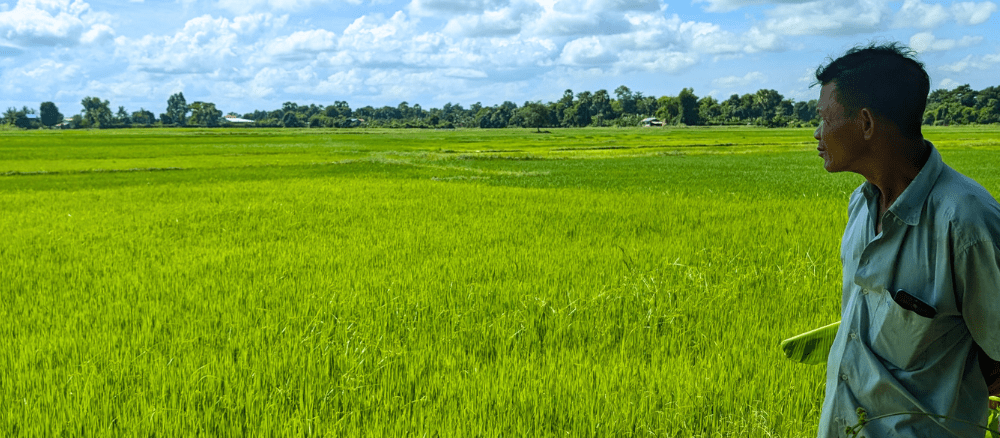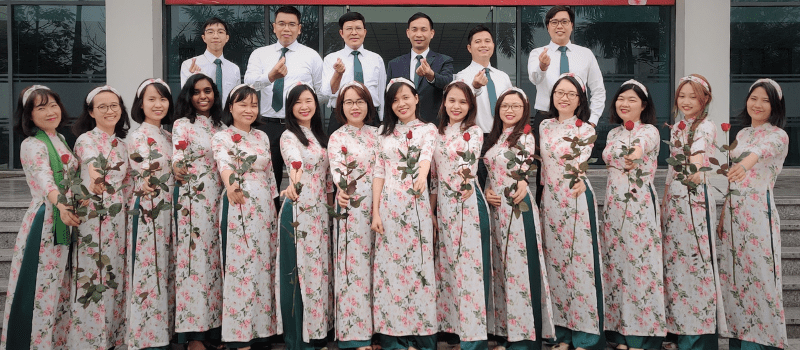This blog was written by Danielle Legault, Program Officer at VWB, following her visit to Cambodia in November 2024 to support our AGROW and VETS programs. Her reflections highlight how climate-smart agriculture is strengthening farmer livelihoods and building community resilience.
Driving along the winding roads of Aek Phnom District in Cambodia’s Battambang Province, you may come across a sign welcoming you to Yoeurn Yorn and Chhaem Chhoeurn’s One Health Demonstration Site. Here, you will find this husband-and-wife duo tending to the legumes in their net house, feeding their growing flock of chickens, and sharing their expertise on sustainable farming with their community.
 PHOTO: Yoeurn and Chhaem in front of their net house.
PHOTO: Yoeurn and Chhaem in front of their net house.
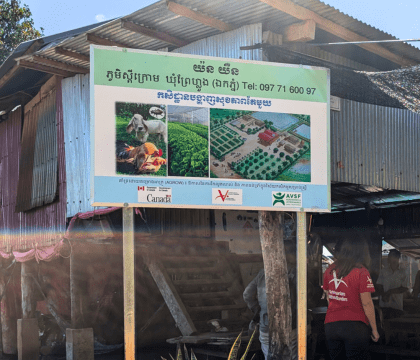 PHOTO: The sign marking the couple's One Health Demo Site.
PHOTO: The sign marking the couple's One Health Demo Site.
 PHOTO: Yoeurn at her improved chicken shed.
PHOTO: Yoeurn at her improved chicken shed.
Just a few years ago, Yoeurn and Chhaem’s lives looked very different.
Like many of their neighbors, the couple once migrated to Thailand for work to support their young family—sometimes only able to return home three days a year. With few opportunities in Cambodia, they had no choice but to seek employment abroad.
Now, after participating in our Agriculture-based Growth and Resilience Opportunities for Women (AGROW) program, the family runs a thriving farm that not only sustains them financially and provides food but has also improved the health of their animals — allowing their cattle, chickens and pigs to live longer and healthier lives. This newfound stability means they can now stay together in Cambodia, pay for school and medical fees, and even connect their home to electricity for the first time.
Their farm is more than a source of income —it’s a One Health Demonstration Site and a hub for community learning. They train other farmers on sustainable agriculture practices, equipping their community with the tools needed to adapt to climate change and build more sustainable food systems.
Cambodia and Climate Change
Globally, small-scale farmers like Yoeurn and Chhaem, feed two out of every three people on the planet. In Cambodia, a country where 80% of the population lives in rural regions, climate change is a threat to livelihoods, food security, economic stability and general wellbeing.
Unpredictable rainfall makes farming increasingly difficult; droughts last longer, making it harder to grow crops, while extreme downpours wash away the ones that do survive. Soil quality is deteriorating as farmers rely on chemical substitutes to boost yields. At the same time, pests and diseases are spreading more easily, affecting plants, livestock and the people who care for them.
 PHOTO: Chhaem Chhoeurn overlooking the family's rice field.
PHOTO: Chhaem Chhoeurn overlooking the family's rice field.
Extreme heat adds to the challenges. In April 2024, the country experienced its hottest recorded day in 170 years, reaching 42.6°C. Climate change, and its rising temperatures, erratic weather, and frequent flooding, is making life for small-scale farmers much more difficult. Overall, Cambodia is one of the most vulnerable countries to climate change worldwide.
So, what can be done to support farmers like Yoeurn and Chhaem?
Climate Smart Agriculture in Action
One solution is Climate-Smart Agriculture: a farming approach that addresses the challenges of climate change by focusing on three key objectives:
- Increasing agricultural productivity: growing more food without further harming the environment.
- Building resilience: adapting to climate risks through new and locally relevant techniques.
- Reducing emissions: adopting agricultural practices that capture carbon and reduce reliance on chemicals.
AGROW’s climate-smart approach comes to life through its 12 One Health Demonstration Sites. Established across three districts in Cambodia, these sites serve as model farms and community learning hubs, showing farmers how to integrate human, animal, and environmental health while adopting sustainable farming practices to mitigate climate change’s worst effects.
Yoeurn and Chhaem were trained in climate-smart farming techniques through AGROW, where they learned how to integrate crop and livestock systems, deter pests without harmful chemicals, and diversify food production.
They now cultivate a wider variety of crops and use nurseries and net houses to improve vegetable yields while protecting them from extreme weather. They have also enhanced livestock feed by incorporating home-grown vegetables, resulting in healthier animals.
 PHOTO: Chhaem shows lemongrass as natural pest control.
PHOTO: Chhaem shows lemongrass as natural pest control.
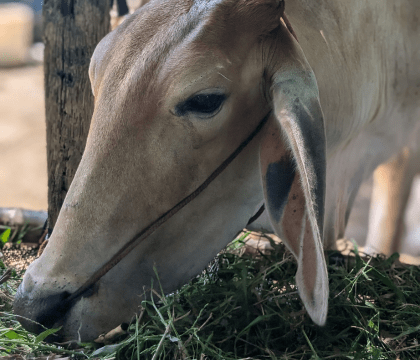 PHOTO: One of the couple's cows with improved feeding.
PHOTO: One of the couple's cows with improved feeding.
 PHOTO: New growth inside the couple's seedling house.
PHOTO: New growth inside the couple's seedling house.
One of their greatest successes has been in pest management and soil health. Instead of using chemical fertilizers and pesticides, Yoeurn and Chhaem now make their own from household ingredients like pepper, alongside pest-repelling plants like marigold and lemongrass which line plant-growing areas. They’ve also built a composting system for household scraps and animal waste to naturally enrich their soil. These techniques keep their crops healthier, reduce costs, and lower their environmental impact.
Community Impact
Through hands-on training at their One Health Demonstration Site, Yoeurn and Chhaem have empowered other farmers to adopt climate-smart practices. Their efforts are making a real impact: so far, they have led 19 training sessions for 114 families, equipping their community with the tools to farm more sustainably.
And it’s working! Across AGROW sites, these low-cost, low-emission strategies have led to increased vegetable production for 98% of participants. Additionally, every single participant —100%—has reported a stronger understanding of sustainable food production and diversification.
In a region facing increasing climate challenges, AGROW demonstrates the transformative potential of climate-smart farming. Its integrated approach has equipped farmers with the tools and knowledge to adopt sustainable and resilient farming practices. Animals are living healthier lives, and their people are better equipped to deal with the shocks that a changing climate brings.
Beyond AGROW
For Yoeurn and Chhaem, farming is no longer just about survival—it’s about possibility. Their journey from uncertainty to leadership proves that climate-smart agriculture is more than a solution; it’s a movement. Through their dedication, their farm has become a powerful example of resilience, proving that when farmers thrive, entire communities do too.
Though AGROW has come to an end, its impact lives on—rooted in the knowledge, innovation, and determination of farmers like Yoeurn and Chhaem.
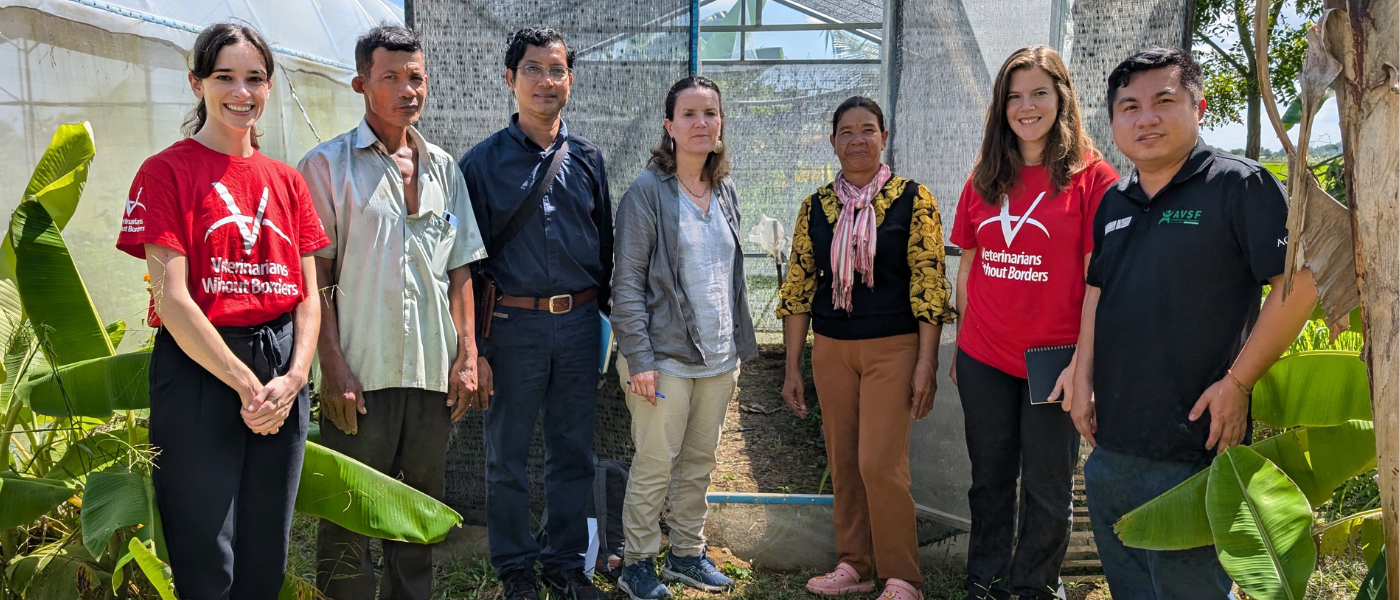 PHOTO: Danielle Legault (left) and Kristen Rodrigues (2nd from right) spent the day with Yoeurn (3rd from right) and Chhaem (2nd from left), alongside our local partner, AVSF Cambodia.
PHOTO: Danielle Legault (left) and Kristen Rodrigues (2nd from right) spent the day with Yoeurn (3rd from right) and Chhaem (2nd from left), alongside our local partner, AVSF Cambodia.
VETS is an 8-year initiative (2020-2028) to improve the economic and social well-being of marginalized people, particularly women and girls, in 6 countries across Africa and Asia. AGROW was a 3-year program (2022-2024) aimed at enhancing the resilience of women and girls in three districts of Cambodia’s Battambang province.
You can donate, volunteer or subscribe to join us in our work to promote healthy animals, sustainable livelihoods, and stronger communities!

